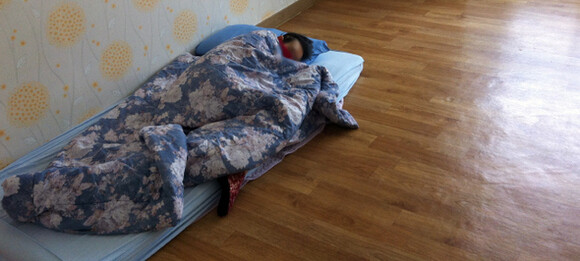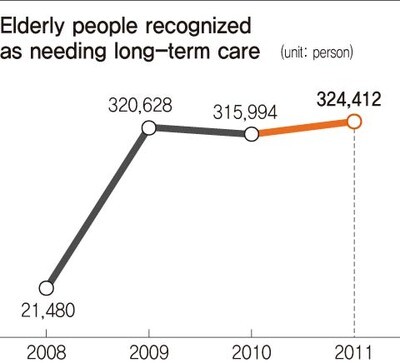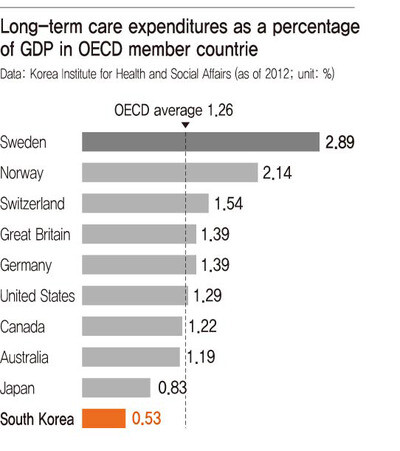hankyoreh
Links to other country sites 다른 나라 사이트 링크
[Special reportage- part II] Elderly people’s lonely lives in a nursing home

By Lee Jeong-gook, staff reporter
On weekends, the nursing home gets crowded with visiting families. On Apr. 14, about 10 family members came to visit the nursing home that I was volunteering at, which was located in a small city of Gyeonggi Province. Kim Keut-nyeo, 89, was alone with no visitors. The family of a dementia patient, who was lying on the bed opposite to Grandma Kim, offered her an orange. All the patients in her room were suffering from dementia except for Grandma Kim, who came to the nursing home simply because she had become old.
Grandma Kim looked out of the window, which was covered by a transparent sheet of plastic. Apparently, the nursing home covered the window to keep out the cold wind. She could have seen the clear blue sky out the window if it was not for the plastic cover, but the view was already dull gray.
Grandma Kim came to the nursing home about 2 years ago. After her husband passed away, who was the manager of a Seoul subway station, she had to move in to her children’s homes. But eventually, she was half-forced to come to the nursing home against her will.

Grandma Kim was proud of her husband and talked a lot about him. “He was very tall and everyone knew him in our town.” Although her eyesight had become blurry because of cataracts, her appearance was different from other elderly in the same room. Her space was always clean and her hair was tidily combed. When Grandma Kim was asked of her past job, she replied “I ran a linen store for a very long time.” She knew the occupations of her children very well. She began by mentioning “My first son… My second son….” and continued to talk about her seven children until she finished off with the story of her youngest daughter. Grandma Kim also perfectly knew where her children lived and even had their phone numbers memorized. But she did not have a mobile phone. Even the dementia patients have their own mobile phones at the nursing home, so what could be the reason for Grandma Kim not having one?
“My daughter-in-law took it away from me,” said Grandma Kim, who frowned for the first time. Before her husband passed away, she lived with her second son. When her husband died of stomach cancer three years ago, her second son inherited the house and she moved to stay with one of her other sons. After a year, on the day that Grandma Kim came back to her original house, her daughter-in-law said, “You don’t need the phone anymore, right?” and took her mobile phone away. Grandma Kim couldn’t find any reasons why she needed it, as she was almost 90, so she let it go.
After a few days, Grandma Kim was forced to move to the nursing home. She tried to speak favorably about her children when she explained, “It’s comfortable for all. My sons are busy because they work in the government and large companies. I don’t want to be a burden on them.”
But her disappointment was shown immediately. “It’s so cold of them. If they knew how difficult it was for me to raise them…” Once she became talkative, she started to openly criticized the nursing home services. She said, “I want to chat with people but everyone here suffers from dementia. I have nothing to do, especially at night. Even the nurses don’t come to the room often.”
Mrs. Kim offered me an orange and continued speaking. “People like me, who have seven children, have to come to the nursing home. (pointing at me) People of your generation don’t have kids. Who will take care of you? You will have to come to a nursing home like this eventually. When you come to a nursing home later on, just let go of everything. Then you will feel comfortable.”
The latter years of the elderly at the nursing home were not “other people’s business”. Mrs. Kim, who allowed me to realize this fact, was not afflicted by geriatric illnesses. “Aging” was the only reason that she was forced to come to the nursing home. Every time Mrs. Kim spotted me, she would recite the stories about her family as if she was boasting of her good memory. At first, I thought that she could be a dementia patient as she always began her story with “I have seven children. Five sons and two daughters.” So I checked the number of her children and her family status, but her answer was always the same. In response to my question, “You are not a dementia patient, are you?”, she smiled and said, “No way. I have the mind of a woman in her 30s.”
Initially, Grandma Kim mentioned that she was satisfied with the services at the nursing home. However, she began to share her real views as time passed. She was mostly dissatisfied with the insincere behavior of the nurses. Male nurses changing her clothes and diaper also made her uncomfortable. At the nursing home, there were many normal elderly people similar to Grandma Kim, who could easily live with their children at home.
Kim Chang-kuk, 96, who practices calligraphy in his room, was also capable of living an ordinary life. To the normal elderly like Mrs. Kim and Mr. Kim, nursing home was a modern version of “Goryeojang”, an ancient practice of abandoning elderly parents to die in an open grave in the mountains.
“Care” without kindness or manners“You feed her kindly, even though you are a man.” was the first comment by Mrs. Kim in the morning of April 9. She was referring to me when I was feeding Maeng Im-saeng, 86. There was a reason for her compliment. Mrs. Maeng was suffering from severe, late-stage dementia. She doesn’t have the strength to chew, so she can only swallow food after it has been cut into pieces. A week after I started volunteering, I realized why the nursing home assigned me to feed Mrs. Maeng: it was because she is the slowest in finishing her meal and taking care of her requires a lot of time. She was famous among the nurses for needing intensive attention. The lunchtime is set from 11:30am to 12:30pm, but Mrs. Maeng requires more than 30 minutes to finish her meal. An hour was barely enough to give her medicine and clean up afterwards. Most of the nurses avoided Mrs. Maeng, as they took a 30-minute break from 12.30pm. Therefore, immediately assigning a new volunteer to take care of her had become a “custom” in the nursing home.
Elderly people who had wished to gracefully enjoy the twilight of their lives were forced to eat their meals fast. It was easy to see the nurses feeding the aged people even faster than ordinary people. One dementia patient could not control his eating speed by himself, but the nurse stuffed food into his mouth. This is the only way that the nurses can extend their break time, so it is not entirely their fault. It is one of the consequences of the poor conditions they work in.
This is the reason why Grandma Kim complimented me. The process of feeding at the nursing home usually lacks kindness and politeness, but I acted differently. When I asked, “Don’t other nurses feed you like this?” to Grandma Kim, she glanced at the door that was slightly open. I noticed her intention and closed the door. She looked at me and commented, “It is the first time that I have ever seen a person feeding the elderly so kindly.” She was clearly witnessing the insincere reality of the nursing care system, where elderly don’t receive the care they need.
Disorganized reactions to emergency cases
On Apr. 4, there was an emergency case at lunchtime. Lee Bong-rae, 84, always needed special care as she often experienced difficulty breathing due to phlegm. One of the full-time nurses began running around, shouting “Suction! Suction! (a medical device used to clear the airway so that a patient may breathe).” Grandma Lee’s air passage suddenly became blocked while eating her lunch. But the nurses were confused about how to respond to the emergency. They started giving out unorganized orders, such as “Call the family members. No, call 119. Actually, bring an oxygen mask first.” They put the oxygen mask on Grandma Lee, but her breathing did not return to normal.
A more absurd thing happened after the emergency workers arrived. None of the nurses led them in the correct direction, even though they entered the wrong room. The emergency workers were led to the room that Grandma Lee was in, only after they furiously said, “You should have led the way for us!” to the nurses. The nursing home always faces the risks of emergency cases, but they were poorly prepared to respond to emergencies.
In the end, after Grandma Lee was informed of her low chance of living in a hospital emergency room, she was brought back to the nursing home. She was moved to “Room no. 111”, where patients temporarily stay right before they die. During the two weeks that I worked at the nursing home, two elderly patients passed away in the room.
On Apr. 9, Park Yeong-hui, 99, also began to have breathing difficulties in the morning. A nurse came to check her blood pressure, which was difficult due to her skeletal arm. The director ordered, “Take her to room no. 111.” A high school volunteer and I moved Grandma Park to the room. This time, the nurse lifted the duvet, revealing Mrs. Park’s twisted ankle. “She will pass away soon. Her ankles show that.” The emergency service soon arrived and Grandma Park was nowhere to be seen afterwards.
Among the elderly people that I met at the nursing home, there were not so many in special circumstances, such as not having any children or living on basic welfare. They were ordinary people that we could easily see around us. But they were spending the last years of their lives in a vulnerable environment that was full of risk factors and human rights violations. What is more worrying is that these unfortunate scenes could be our own future soon.
The names of sources in this article have been changed to protect their privacyTranslated by Kang Soo-bin, Hankyoreh English internPlease direct questions or comments to [english@hani.co.kr]

Editorial・opinion
![[Column] A death blow to Korea’s prosecutor politics [Column] A death blow to Korea’s prosecutor politics](https://flexible.img.hani.co.kr/flexible/normal/500/300/imgdb/original/2024/0415/7517131654952438.jpg) [Column] A death blow to Korea’s prosecutor politics
[Column] A death blow to Korea’s prosecutor politics![[Correspondent’s column] The US and the end of Japanese pacifism [Correspondent’s column] The US and the end of Japanese pacifism](https://flexible.img.hani.co.kr/flexible/normal/500/300/imgdb/original/2024/0412/1017129080945463.jpg) [Correspondent’s column] The US and the end of Japanese pacifism
[Correspondent’s column] The US and the end of Japanese pacifism- [Guest essay] How Korea turned its trainee doctors into monsters
- [Guest essay] As someone who helped forge Seoul-Moscow ties, their status today troubles me
- [Editorial] Koreans sent a loud and clear message to Yoon
- [Column] In Korea’s midterm elections, it’s time for accountability
- [Guest essay] At only 26, I’ve seen 4 wars in my home of Gaza
- [Column] Syngman Rhee’s bloody legacy in Jeju
- [Editorial] Yoon addresses nation, but not problems that plague it
- [Column] Can Yoon and Han stomach humble pie?
Most viewed articles
- 1[Guest essay] How Korea turned its trainee doctors into monsters
- 2[News analysis] Watershed augmentation of US-Japan alliance to put Korea’s diplomacy to the test
- 3[Column] A death blow to Korea’s prosecutor politics
- 4[Photo] Cho Kuk and company march on prosecutors’ office for probe into first lady
- 5[Column] A third war mustn’t be allowed
- 6‘National emergency’: Why Korean voters handed 192 seats to opposition parties
- 7Exchange rate, oil prices, inflation: Can Korea overcome an economic triple whammy?
- 8After Iran’s attack, can the US stop Israel from starting a regional war?
- 9[Editorial] New KBS chief is racing to deliver Yoon a pro-administration network
- 10[Editorial] S. Korea should take a note from US-China tactical compromise